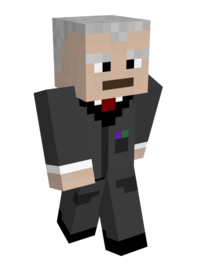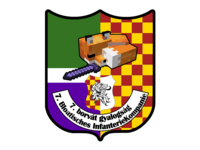Kenneth Infaru
Kenneth Infaru (née Kenneth Finskaravu; May 9, 1858 - April 13, 1919) was a Farun revolutionary and Slorbo-Glormorian military officer. He is most known for leading the struggle for Faru's independence.
Infaru was born in a southern Farun village under the Slorbo-Glormorian Empire. He attended the Blojevo Military Academy, becoming a sergeant in the imperial military at the age of 24. Over the next 30 years he climbed to the rank of captain. He was a decorated war hero of the Great War, but was never allowed to climb in rank in the military due to the terms of the treaty between Bloatia and the empire. In the wake of the imperial collapse of 1918, he founded the Infaru Liberation Army and led Farun independence.
Infaru was killed on April 13, 1919 by a Bloatian nationalist named Brit Slovenia, shortly after Faru secured its independence from Bloatia.
Early life
Kenneth Infaru was born as Kenneth Finskaravu to a Slorbo-Bloatian family in modern-day southern Faru. He spent much of his youth working in his family's farmstead, which he disliked. He turned to the military as a way to escape rural squalor, and managed to save up his salary to enroll in the Blojevo Military Academy where he gained his commission by the age of 24.
Military career
Before the great war
Infaru spent most of his military career in peacetime, serving as military police sergeant in various regions of the empire, shutting down unrest, minor ethnic uprisings and keeping the peace in the troubled imperial periphery. He was skilled enough and rose in the ranks of the military, becoming a captain by 1912, allowing him to form and run his own company: the 7th Bloatian Infantry Company.
During this time, he got somewhat involved in the Farun liberal movement, never approving of the radical elements but sympathizing with the idea of a Farun identity and of greater autonomy for his homeland. Along those ideological lines, he organized his company as the first ever all-Farun company, wanting to prove the strenght of his people to the imperial apparatus.
Great war
When the war broke out, Infaru's company was sent to he western front as a part of the 1st Bloatian Land Army Regiment. His company spearheaded successful offensives into the Swopian heartland in April 1914 where he personally stormed the city centre of Prinsk, capturing the city and recieving the Order of the Imperial Lion award.
His regiment was redeployed to the much more crucial southern front in Gilgeria by 1915, where he spent most of the war fighting in gruesome positional warfare. During the war, he was one of the lower ranking officers who implemented logistical reforms to his unit which had the effect of less lives lost in his company. By late 1917, the empire started buckling from the pressure of the war, and his company was reallocated to the military police as to maintain order within the tumultuous heartland. The timing was excellent as the front would collapse a week later.
Farun Independence
Following the secession of Bloatia from the empire, Infaru's unit was handed over to the duchy of Bloatia, and was shortly loyal to them. However it became quickly obvious that the duchy was unable to compensate any of its troops, and chaos ensued. Infaru was originally a part of the new Bloatian state, though tensions arose between the parliamentarians of the Bloatian legislative (who headed the independence effort) and the growing popularity of the captain. Infaru began publicly decrying the leading Bloatian politicians as corrupt and traitors; the Bloatian parliamentarians, in return, dubbed him and his company as illegal mercenary forces. Following this, Kenneth broke off with the Bloatian independence movement and. by 1918, reformed his company into the Infaru Liberation Army, with the goal of creating an independent Farun state. The army was joined by the many disgruntled Farun veterans who were pouring back into the region and not being compensated by the Duchy of Bloatia.
Infaru's army grew from a few hundred to a few thousand in a matter of months. Though a smaller force, Infaru's forces were able to out manuveur the larger and disorganized Bloatian armies; his army was helped by the nuanced logistical system he established in contrast to Bloatia's. By April 1919, Faru was an independent state; Infaru started organizing a constitutional convention. During his army's struggle for independence, several Bloatian and Shlorbo villages were razed under the guise of "anti-imperial" campaigns, such razings were continued even after the end of the war, notably by general Loga Pincoya.
Kenneth Infaru died on April 13, 1919. He was shot in the head in the middle of a speech by Bloatian nationalist named Brit Slovenia, who was disgruntled with the idea of a Farun state.
Political Beliefs
Kenneth Infaru described himself as a liberal, often speaking of the importance of democracy and secularism even before his struggle for Farun independence.
He was for the longest time in favour of Farun autonomy within the empire, believing that peaceful coexistence and democratic autonomy within the imperial framework was the best way for Faru to develop itself and thrive. He seemingly pivoted away from this position around early 1918, likely seeing the tides changing and the rapid radicalization of great war veterans.



